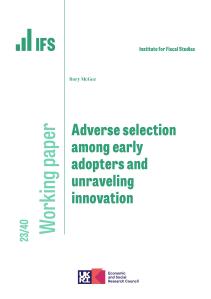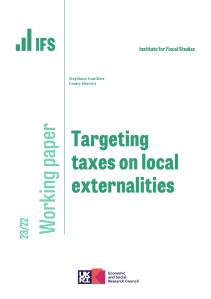We consider a revealed preference-based method that will bound the minimal partition of consumer microdata into a set of preference types such that the data are perfectly rationalisable by standard utility theory. This provides a simple, non-parametric and theory-driven way of investigating unobserved preference heterogeneity in empirical data, and easily extends to any choice model which has a revealed preference characterisation. We illustrate the approach using survey data and find that the number of types is remarkably few relative to the sample size – only four or five types are necessary to fully rationalise all observed choices in a data set with 500 observations of choice vectors.
Authors

Ian Crawford

Research Fellow Simon Fraser University
Krishna is a Research Fellow at the IFS, a Professor at Simon Fraser University and has an Economics Endowed Professorship at Simon Fraser University.
Journal article details
- DOI
- 10.1111/j.1468-0297.2012.02545.x
- Publisher
- Wiley
- Issue
- Volume 123, Issue 567, March 2013, pages 77-95
Suggested citation
Crawford, I and Pendakur, K. (2013). 'How many types are there?' 123(567/2013), pp.77–95.
More from IFS
Understand this issue

What's wrong with inflation?
10 May 2023

Transparency is key to maintaining trust in government. Let’s not cap it
12 September 2022

How should the government tax electric cars?
19 May 2022
Policy analysis

Tax and public finances: the fundamentals
23 August 2023

Poverty
13 July 2023

Living standards, poverty and inequality in the UK: 2023
13 July 2023
Academic research

Saving by buying ahead: stockpiling in response to lump-sum payments
2 February 2024

Adverse selection among early adopters and unraveling innovation
18 December 2023

Targeting taxes on local externalities
14 August 2023